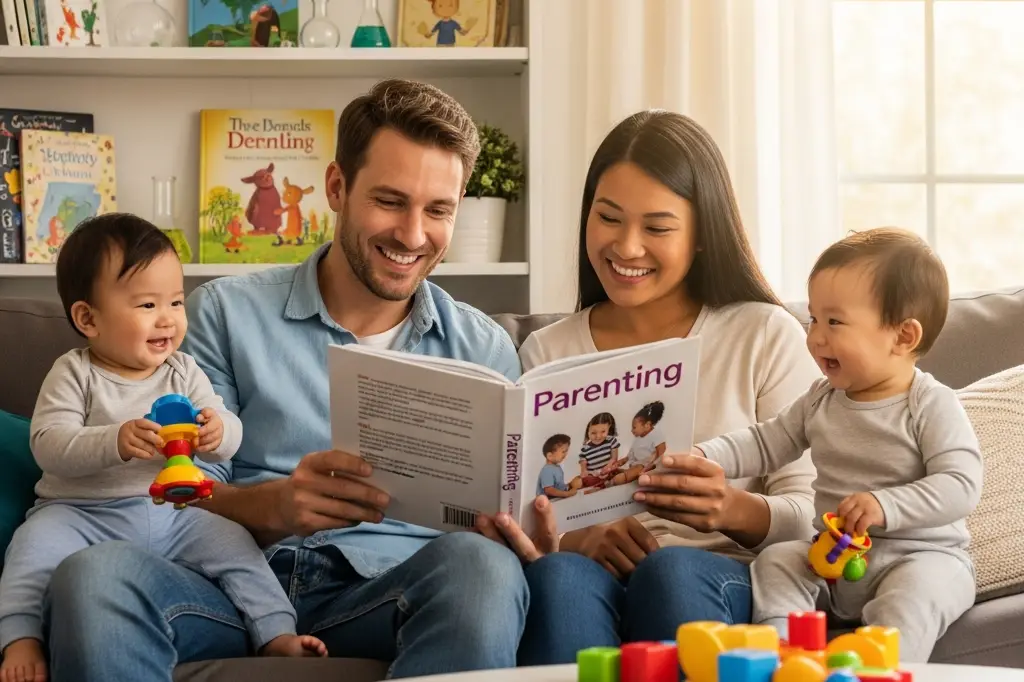Raising twins isn’t just double the babies, it’s double the questions, double the challenges, and double the love. But how do you sort through the endless advice to find what actually works?
In this guide, we blend evidence-based twin parenting with real stories from parents who’ve been there. You’ll get:
- Science-backed tips on sleep, feeding, and development.
- Relatable stories from twin parents who faced (and overcame) the same struggles.
- Actionable strategies to help you feel confident, not overwhelmed.
Whether you’re expecting twins or deep in the toddler years, this post is your roadmap backed by research and filled with real-life wisdom.
Why Twin Parenting Needs Science and Stories
Parenting twins is a unique journey, one that often leaves moms and dads searching for reliable answers. But here’s the truth: facts alone aren’t enough. You need both evidence-based strategies and real parent experiences to thrive.
The Science: Why Research Matters
Studies show twin parents face higher stress levels, less sleep, and tougher logistical challenges than parents of singletons. For example:
- Sleep deprivation is more common (Stanford Pediatrics, 2022).
- Feeding schedules require military-level precision (La Leche League, 2023).
- Speech delays occur in 50% of twins (NIH, 2021).
Without science, you’re guessing. But without stories, you’re missing the emotional support that keeps you going.
The Stories: Why Experience Counts
Research gives you the what, but stories give you the how. Like Sarah, a mom of twins who shared:
“I read all the sleep training books, but nothing worked until another twin mom told me, ‘Try shifts, one handles nights, the other mornings.’ That saved us.”
Stories like this:
- Offer practical hacks you won’t find in studies.
- Reduce isolation – you realize you’re not alone.
- Make science feel possible – because if they did it, so can you.
The Perfect Balance
Evidence-based twin parenting means using research as your foundation, then leaning on stories for real-world application. Next, we’ll dive into the science of twin milestones and how to apply it at home.
Evidence-Based Twin Milestones: What Science Tells Us
Watching your twins grow is exciting but it’s easy to worry if they’re hitting milestones “on time.” The truth? Twins develop differently than singletons, and that’s completely normal. Here’s what research says about twin development and how to support it.
Physical Milestones: Crawling, Walking, and Beyond
Studies show twins may reach motor skills slightly later than singletons. A 2021 NIH report found:
- Twins crawl 1–2 months later on average due to less tummy time (sharing space makes it harder!).
- Walking often starts by 15 months (vs. 12 months for singletons).
What helps?
✔ Extra floor time – rotate twins in separate play areas.
✔ Supportive gear – like activity centers to build leg strength.
Speech and Language: When to Expect First Words
About 50% of twins experience mild speech delays, per the Journal of Pediatrics. Why?
- Less one-on-one talk time with parents.
- “Twin talk” (private language between twins) can delay outside speech.
Boost language skills with:
✔ Narrating daily tasks (“Now we’re putting on your blue socks!”).
✔ Reading separately to each twin for 10 minutes daily.
Social and Emotional Development
Twins often bond intensely but may struggle with independence. Research suggests:
- Separation anxiety peaks later (around age 3 vs. 2 for singletons).
- Sharing tantrums are common – one twin’s mood often triggers the other.
Pro tip:
✔ Praise individual efforts (“I love how you stacked those blocks, Emma!”).
Real Stories: Sleep Training Twins Without Losing Your Mind
If you’re exhausted from round-the-clock twin feedings, you’re not alone. Sleep deprivation is the #1 challenge for new twin parents (Stanford, 2022). But there’s hope these evidence-based strategies and real parent stories can help.
The Science: How Twin Sleep Differs
- Twins wake each other up 73% more than singletons (Pediatric Sleep Journal).
- Syncing schedules is possible – but takes consistency.
What works?
✔ “Dream feeds” (feeding both at the same time, even if one’s asleep).
✔ White noise machines to mask sibling noises.
A Real Parent’s Sleep Training Journey
“We tried every method, but the ‘gradual retreat’ finally worked. Here’s how:
- Week 1: Rocked both to drowsy, then put them down awake.
- Week 2: Sat by the crib until they fell asleep (no touching).
- Week 3: Left the room after bedtime routine.
By month 2, they slept 6-hour stretches!”* – Mark, dad of 8-month twins
Your Action Plan
- Track sleep patterns (try the Huckleberry app).
- Sync naps first – wake the sleeper if one twin naps longer.
- Split nighttime duties (e.g., one parent handles feedings until 2 AM).
Key takeaway: Consistency + teamwork = more sleep for everyone.
Feeding Twins: Evidence Meets Reality
Feeding two babies at once can feel like a marathon one that runs 24/7. Whether you’re breastfeeding, bottle-feeding, or doing both, science and real parent experience can help you find your rhythm. Here’s what works.
The Science of Feeding Twins
Research shows twin parents face unique feeding challenges:
- Milk supply may be lower initially (La Leche League, 2023).
- Synchronized schedules reduce feeding time by 30% (Journal of Pediatrics).
- Formula supplementation is common and completely okay.
Breastfeeding Tips:
✔ Tandem feeding saves time, use a twin nursing pillow.
✔ Power pumping can boost supply (10 minutes on, 10 off for an hour).
Bottle-Feeding Hacks:
✔ Pre-measure formula in dispensers for night feeds.
✔ Assign bottles to each twin to avoid germ sharing.
A Real Parent’s Journey
“I planned to exclusively breastfeed, but my twins lost weight. Our doctor suggested combo-feeding formula at night, breastmilk during the day. It saved my sanity and kept them full.” – Lisa, mom of 6-month twins
Solid Food Transition:
- Start one twin at a time to spot allergies.
- Use two high chairs side-by-side for messy but efficient meals.
Nurturing Individuality: Beyond ‘The Twins’
It’s easy to see twins as a unit, but each child is unique. Research shows twins thrive when parents foster their individuality early. Here’s how.
Why Individuality Matters
- Self-esteem grows when twins feel seen as separate people (Child Development, 2022).
- Language delays improve with one-on-one time (NIH).
Practical Ways to Encourage Uniqueness
✔ Use their names – not “the twins.”
✔ Plan separate activities (e.g., different playdates).
✔ Celebrate differences (“You love blocks, and your sister loves dolls!”).
A Parent’s Story
“We started ‘special time’ 15 minutes daily with each twin alone. The change was incredible. They became more confident and talked more.” – David, dad of 3-year-old twins
Key Takeaway: Small steps make a big difference in helping twins grow as individuals.
Building Your Support System: A Data-Driven Village
Twin parenting isn’t meant to be done alone and research proves it. Studies show parents of multiples with strong support systems experience:
- Lower stress levels (APA, 2023)
- Reduced risk of postpartum depression (Journal of Pediatrics, 2022)
- Better long-term parenting satisfaction
How to Build Your Twin Tribe
1. Lean on Local Resources
✔ Join twin-specific parenting groups (check Facebook or Meetup)
✔ Connect with your local Mothers of Multiples (MOST) chapter
2. Delegate Tasks Effectively
- Create a meal train for the first 3 months
- Assign specific helpers (e.g., “Grandma handles Tuesday baths”)
3. Find Your Online Community
“The Twiniversity forum saved me during those 3 AM feedings. Knowing others were awake too made it bearable.” – Sarah, mom of 1-year-old twins
Pro Tip: Be specific when asking for help. Instead of “Can you help sometime?” try “Could you hold the babies every Thursday from 2-4 PM?”
Your Toolkit: Evidence-Based Resources
Cut through the noise with these science-backed tools for twin parents:
Must-Have Apps
- Baby Tracker (for syncing feedings/diapers)
- Huckleberry (sleep prediction algorithm)
Best Books
- When You’re Expecting Twins (evidence-based pregnancy guide)
- Raising Twins (developmental milestones explained)
Trusted Organizations
- MOST (Mothers of SuperTwins) – mostonline.org
- Twiniversity – free webinars and resources
Final Tip: Bookmark 2-3 reliable sources to avoid information overload. Quality beats quantity when researching twin parenting.
Conclusion: You’ve Got This And We’ve Got You
Raising twins is challenging, but you’re already doing an amazing job. Remember:
✔ Science gives you tools – stories give you hope
✔ Progress over perfection – what works today might change tomorrow
✔ Your twin community is your secret weapon
Now we want to hear from you! What’s your #1 twin parenting challenge? Share in the comments below, your story might help another twin parent feel less alone.
Want more twin-tested tips?
📌 Bookmark this page for future reference
📌 Check out next: Parenting twins individuality shared identity
You’re not just raising twins, you’re becoming part of an incredible community that gets it. And we’re right here with you every step of the way.


